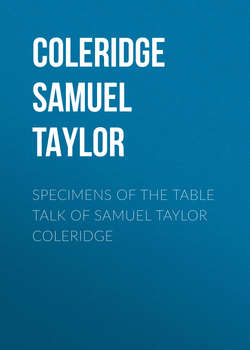Читать книгу Specimens of the Table Talk of Samuel Taylor Coleridge - Coleridge Samuel Taylor - Страница 65
TABLE TALK
June 6. 1830
ОглавлениеCATHOLICITY.—GNOSIS.—TERTULLIAN.—ST. JOHN
In the first century, catholicity was the test of a book or epistle— whether it were of the Evangelicon or Apostolicon—being canonical. This catholic spirit was opposed to the gnostic or peculiar spirit,—the humour of fantastical interpretation of the old Scriptures into Christian meanings. It is this gnosis, or knowingness, which the Apostle says puffeth up,—not knowledge, as we translate it. The Epistle of Barnabas, of the genuineness of which I have no sort of doubt, is an example of this gnostic spirit. The Epistle to the Hebrews is the only instance of gnosis in the canon: it was written evidently by some apostolical man before the destruction of the Temple, and probably at Alexandria. For three hundred years, and more, it was not admitted into the canon, especially not by the Latin church, on account of this difference in it from the other Scriptures. But its merit was so great, and the gnosis in it is so kept within due bounds, that its admirers at last succeeded, especially by affixing St. Paul's name to it, to have it included in the canon; which was first done, I think, by the council of Laodicea in the middle of the fourth century. Fortunately for us it was so.
* * * * *
I beg Tertullian's pardon; but amongst his many bravuras, he says something about St. Paul's autograph. Origen expressly declares the reverse.
* * * * *
It is delightful to think, that the beloved apostle was born a Plato. To him was left the almost oracular utterance of the mysteries of the Christian religion while to St. Paul was committed the task of explanation, defence, and assertion of all the doctrines, and especially of those metaphysical ones touching the will and grace;66 for which purpose his active mind, his learned education, and his Greek logic, made him pre-eminently fit.
66
"The imperative and oracular form of the inspired Scripture is the form of reason itself, in all things purely rational and moral."—Statesman's Manual, p. 22.
